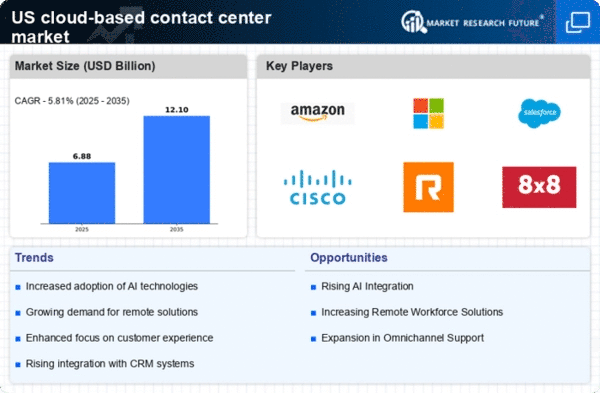Cost Efficiency and Scalability
Cost efficiency and scalability are pivotal drivers in the cloud based-contact-center market. Organizations are increasingly drawn to cloud solutions due to their ability to reduce operational costs while providing the flexibility to scale services according to demand. A recent analysis revealed that companies can save up to 40% on operational expenses by transitioning to cloud-based contact centers. This financial incentive is compelling, particularly for small to medium-sized enterprises that may lack the resources for traditional infrastructure. The cloud based-contact-center market is thus witnessing a shift as businesses seek solutions that not only enhance service delivery but also align with budgetary constraints. As the market evolves, the emphasis on cost-effective and scalable solutions is expected to remain a dominant theme, influencing purchasing decisions across various sectors.
Integration of Advanced Analytics
The integration of advanced analytics into the cloud based-contact-center market is transforming how organizations understand and engage with their customers. By leveraging data analytics, companies can gain insights into customer behavior, preferences, and trends, enabling them to tailor their services more effectively. Recent studies indicate that organizations utilizing analytics in their contact centers have seen a 25% improvement in customer satisfaction scores. This trend is likely to continue as businesses recognize the value of data-driven decision-making. The cloud based-contact-center market is thus becoming increasingly sophisticated, with providers offering tools that facilitate real-time data analysis and reporting. As a result, companies are better equipped to optimize their operations, enhance customer experiences, and drive revenue growth through informed strategies.
Growing Emphasis on Customer Experience
In the cloud based-contact-center market, there is a growing emphasis on enhancing customer experience as a key differentiator. Organizations are increasingly recognizing that superior customer service can lead to higher retention rates and increased loyalty. This focus is reflected in the fact that 70% of companies are prioritizing investments in technologies that improve customer interactions. The cloud based-contact-center market is responding to this demand by offering solutions that enable personalized and efficient service delivery. Features such as AI-driven chatbots, automated responses, and integrated communication channels are becoming standard offerings. As businesses strive to create seamless and engaging customer journeys, the cloud based-contact-center market is likely to see continued growth, driven by the need to meet evolving customer expectations and preferences.
Rising Demand for Remote Work Solutions
The cloud-based contact center market is experiencing a notable surge in demand for remote work solutions. As organizations increasingly adopt flexible work arrangements, the need for cloud-based systems that facilitate remote customer interactions has become paramount. This shift is evidenced by a reported 30% increase in cloud-based contact center deployments in the past year alone. Companies are seeking to enhance their operational efficiency while ensuring seamless communication with customers, regardless of location. The cloud based-contact-center market is thus positioned to benefit from this trend, as businesses prioritize solutions that support remote work capabilities. Furthermore, the ability to scale operations quickly and adapt to changing workforce dynamics is driving investments in cloud technologies, which are perceived as essential for maintaining competitive advantage in a rapidly evolving business landscape.
Technological Advancements in Communication Tools
Technological advancements in communication tools are significantly impacting the cloud based-contact-center market. Innovations such as VoIP, video conferencing, and instant messaging are reshaping how businesses interact with customers. These technologies enable more dynamic and responsive communication, which is increasingly demanded by consumers. Recent data suggests that companies utilizing advanced communication tools have experienced a 20% increase in customer engagement levels. The cloud based-contact-center market is adapting to these changes by integrating cutting-edge technologies that facilitate multi-channel interactions. As organizations strive to meet the expectations of a tech-savvy customer base, the adoption of these tools is likely to accelerate, further driving growth in the cloud based-contact-center market.
















